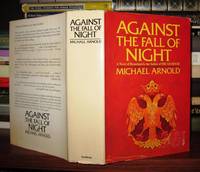Against the Fall of Night
 Usually, if I have a favorite book I can count on someone else having heard of it. If I mention The Chronicles of Amber, or Swords Against Death (failing that, Fafhrd and the Gray Mouser), Robert E. Howard, or even Harold Lamb, most of my reader friends will have heard of the book, author, or series. Most of us fantasy and science fiction readers of a certain age have been exposed to these works.
Usually, if I have a favorite book I can count on someone else having heard of it. If I mention The Chronicles of Amber, or Swords Against Death (failing that, Fafhrd and the Gray Mouser), Robert E. Howard, or even Harold Lamb, most of my reader friends will have heard of the book, author, or series. Most of us fantasy and science fiction readers of a certain age have been exposed to these works.
But no one ever seems to have heard of Michael Arnold’s Against the Fall of Night. I looked it up on Goodreads this morning and found one lone reviewer had given it five stars. Everyone else (but me, now) had only checked it off as something they wanted to read.
Published in 1975, Against the Fall of Night is (mostly) set during the time of the last gasp of the Byzantine Empire, during the reign of the Comnenus dynasty. And its main figure is Andronikus, the one man who might have saved the empire from the horrible mismanagement of his cousin Manuel if he’d had just a little more time and a little better luck. Manuel inherits the throne when he and Andronikus are both young men and then gradually, choice after disastrous choice, fritters away resources and opportunities.
Andronikus is a complex figure — charismatic, rash, daring, and brilliant. He’s torn by loyalty to his cousin and his sense that he could do far better, and eventually rebels. He’s the closest literary figure I’ve ever seen to Zelazny’s Corwin of Amber. Minus the ability to ride through shadow, I mean.
The novel opens with the sacking of Constantinople by the Franks during the 4th Crusade, after which Constantinople and the empire endured only as a shadow of its former glory. Arnold postulates that if Andronikus had succeeded, the sacking would never have happened, and once you get to know Andronikus over the course of the novel you’re pretty certain he’s right.
I stumbled upon Against the Fall of Night while I was wandering through the county library late in junior high. I’d never heard of the book or the author, but the blurb looked good. It was probably the thickest tome I’d ever read at the time, and I have to confess that during the long opening prologue, when it’s mostly about the horrible sacking of Constantinople, I almost stopped reading. But once the main portion began I was almost immediately enthralled. Arnold brought the time and place to life so well that the strange became real. From the outset I knew Andronikus would fail, but I didn’t know how, or why it mattered. Pretty soon I began to care, deeply, and was rooting him on.
I loved that book. It was the first non-spec fic book I’d ever read that I liked so well, and it launched me into an exploration of other books about the Byzantine Empire… but none were as good, and by the end of the summer I’d actually checked it out again and read it all the way through. In my mid-twenties my friend Robert Farley found a copy at a library book sale and gifted it to me, and I discovered it was just as fine on a third reading. Powerful, moving, full of fascinating characters, intrigue, and action, it was just one helluva good read.
Yet it seems to have been the last book Michael Arnold ever wrote. I’ve never been able to learn much more about Mr. Arnold, and, as I mentioned, never met anyone but Robert who had read and enjoyed the book. These days, when fantasy readers routinely seem to prefer monster tomes of multiple volumes, I imagine they might find Against the Fall of Night right up their alley. Sure, there’s no dragons or magic, but there’s a lot of popular low magic settings in print today. And the setting is so vivid yet unfamiliar it might as well be an imaginary place. Most of us really don’t know too much about the late Byzantine Empire.
Has anyone else out there read and loved this book? If not, will someone read it? Maybe we can form a club and wear I Heart Andonikus t-shirts to conventions…
12 Comments